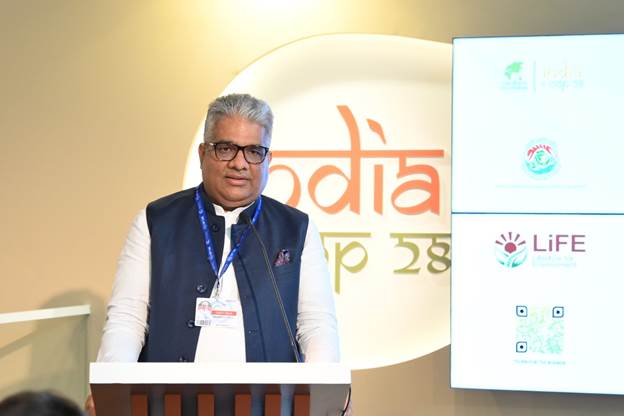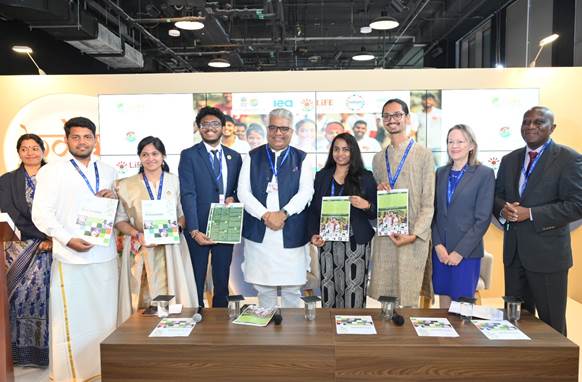Sense of superiority over nature a fundamental mistake, harbinger of all environmental woes for humanity: Union Environment Minister Bhupender Yadav
Union Minister for Environment, Forest and Climate Change Shri Bhupender Yadav has today said that the youth of today will be the custodians of Planet Earth tomorrow and their participation in attempts to save the planet is of utmost importance. Underlining this importance of youth in driving the conversation on climate, he said that the Government of India attaches high importance to addressing the impact of climate change on the lives of the youth.
Speaking at an event on Youth Actions on Lifestyle for Environment (LiFE) at the India Pavilion at COP28 summit venue in Dubai, UAE, Shri Yadav said that the youth and the children care deeply about the environment when the older generation has been found lacking.

The Minister said that two thoughts drive the world today. One is the climate apocalypse stream of thought that believes the collapse of human civilization is inevitable because of climate change. And then there were those with a technocentric world view. Technocentrism, he added, believes in technology and its ability to control and protect the environment as the ultimate truth. Technocentrists believe technology will ultimately manage to save us all from climate change.
However, the Minister warned, truth lies somewhere in between. “If we don’t move to urgent climate action, our end is a given. While technology does offer solutions, it cannot work in isolation”, Shri Yadav said.
He emphasized that technological solutions have to be tempered with environmental consciousness and that is the only way for us to save the world. Underlining the role of youth in this, he said that when it comes to instilling environmental consciousness in people, we must ‘catch them young’.
Shri Yadav delved into the relation humans have with nature and how it has been disrupted by uncontrolled industrialisation and rapid urbanization driving us away from nature. “The downside of this distancing has made us forget that we are one with nature. We are part of a larger ecosystem which also includes animals, birds, rivers, mountains, trees and other life forms”, he went on to add. Seeing us as different from nature and sense of superiority was the fundamental mistake that has been the harbinger of all environmental woes for humanity.
So far as environment protection is concerned, the track record of this generation and those from earlier generations has been dismal. The worst sufferers of this failure and of climate change and environmental degradation are children, women, the differently abled and those in the poorest, remotest communities with the scarce resources
HIghlighting the ethos of the Indian government, Shri Yadav said that the Government believes the environment is not just to be protected but the ecosystem needs to be restored. This task, he added, cannot be done by a few and it needs the individual participation of 8 billion people of Planet Earth.
The Minister spoke of a sustainable lifestyle through a paradigm shift from mindless and destructive consumption to mindful and deliberate utilization. Enshrined in Mission LiFE, the Minister invited people to assess the environmental impact of their actions to evaluate if the actions contribute to the problem or enhance the solution.
The results of Mission LiFE have been very encouraging. Since the launch of this LiFE movement, India has made considerable progress and in the past year, the government has focused on increasing youth ownership of Mission LiFE.
The youth has the power to drive environmental revolution. He exhorted the youth to follow 7 steps to a sustainable lifestyle and reduction of individual carbon emission viz save water, save energy, reduce waste, reduce e-waste, reduce single-use plastics, adopt sustainable food systems, and adopt healthy lifestyles.
Citing the International Energy Agency’s analysis of the LiFE initiative Shri Yadav said that 2 billion tonnes of CO2 emissions can be reduced through the adoption of LiFE-aligned measures worldwide.
The event witnessed the participation of four Young Climate Leaders from India – Mahiya Kulsoom, Arkesh Kedar Shenoy, Manjusha Manchala, and Aswini Kumar Paital – who have been recognised for their exceptional on-ground efforts on climate change and environmental sustainability.
Mr. George Laryea-Adjei, Director Programmes at UNICEF, highlighted the impact of climate change on one billion children worldwide and said, “Children and youth are at the frontline of the planetary challenges created by climate change. UNICEF and YuWaah/GenU are working with the Government of India to engage and build capacities of youth to voice their concerns on climate change and environmental degradation and implement solutions, for themselves, their families, and their communities. Globally, the launch of our youth climate campaign ‘Green Rising’ and the ‘Green Rising India Alliance’ (GRIA) during COP28 strengthens our efforts of bringing together Public-Private-Youth for collective impact.”
Referring to Mission LiFE, IEA’s Deputy Executive Director, Mary Burce Warlick said, “The International Energy Agency’s analysis of the LiFE initiative shows that two billion tonnes of CO2 emissions can be reduced through the adoption of LiFE-aligned measures worldwide.” She also highlighted the role of policy in supporting sustainable choices.
Mr. Thomas Spencer, Power Sector Modeller at IEA, presented IEA’s report, “A Policy Toolkit for Implementing LiFE,” which provides a concrete roadmap for advancing LiFE implementation. He outlined the role policy can play in supporting behavioral change and consumption choices.
The event was organised in collaboration with UNICEF, its public-private-youth partnerships platform YuWaah (known as Generation Unlimited globally), and the International Energy Agency (IEA),
Presenting the India National Youth Statement which was drafted by over 130 youth at the Local Conference of Youth (LCOY) held in September this year, Akhilesh Anil Kumar from Bring Back Green (BBG) Foundation reiterated that funding for youth led pro-planet startups would help in increasing youth and community engagement in the battle against climate change.

The initiatives showcased by the youth covered a wide range of environmental issues, including groundwater conservation, zero waste practices, clean air advocacy, agroforestry, biodiversity preservation, seed banking, carbon capture, plastic waste management, mangrove restoration, afforestation, land degradation prevention, climate-resilient planning, and municipal collaboration.
The side event builds on the Mission LiFE, the Meri LiFE platform, and ‘In Our LiFEtime’ campaign launched by the Government of India during the COP26 and COP27 summits. The side-event showcased India’s commitment to actively involve young and emerging leaders in addressing environmental challenges and engaging them in the global climate change dialogue.

